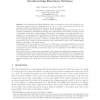Free Online Productivity Tools
i2Speak
i2Symbol
i2OCR
iTex2Img
iWeb2Print
iWeb2Shot
i2Type
iPdf2Split
iPdf2Merge
i2Bopomofo
i2Arabic
i2Style
i2Image
i2PDF
iLatex2Rtf
Sci2ools
111
click to vote
IACR
2011
2011
Concise Vector Commitments and their Applications to Zero-Knowledge Elementary Databases
Zero knowledge sets (ZKS) [18] allow a party to commit to a secret set S and then to, non interactively, produce proofs for statements such as x ∈ S or x /∈ S. As recognized in [10], the key ingredient of ZKS is a primitive called (trapdoor) mercurial commitment. This primitive was later generalized by Catalano, Fiore and Messina [9] who proposed the notion of (trapdoor) q-Mercurial Commitment (q-TMC for short) which allows to (mercurially) commit to vectors of q messages, rather than to single messages. This property is interesting as openings of specific vector positions can be made short and independent from q. Moreover, Catalano et al. show that one can get Compact Zero Knowledge Sets (i.e. ZKS with very short proofs) when combining q-TMC with a Merkle tree of branching degree q. The first construction of q-TMC with constant size openings, however, was proposed only very recently, by Libert and Yung in [16]. Their solution relies on the q-Diffie-Hellman Exponent assumption ov...
Cdh | IACR 2011 | Knowledge Sets | Zero Knowledge |
| Added | 23 Dec 2011 |
| Updated | 23 Dec 2011 |
| Type | Journal |
| Year | 2011 |
| Where | IACR |
| Authors | Dario Catalano, Dario Fiore |
Comments (0)

